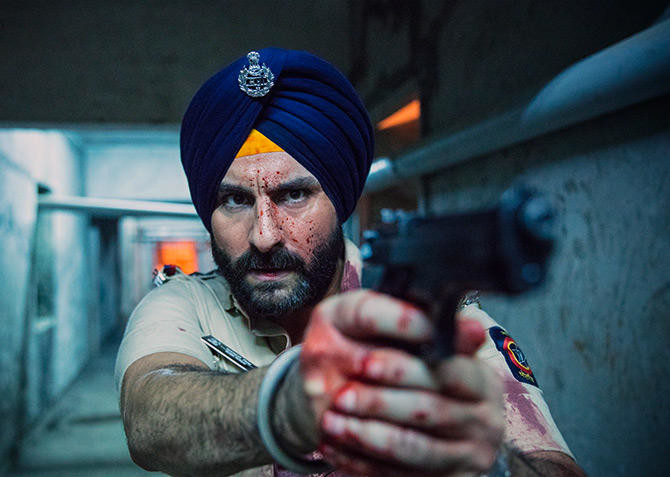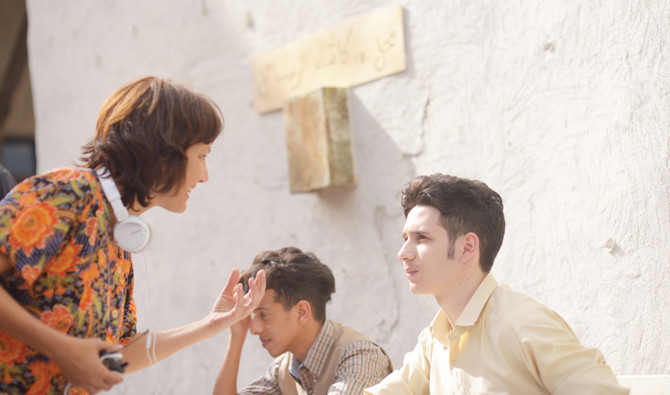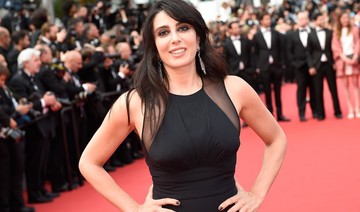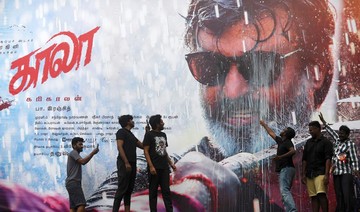CHENNAI: Netflix’s first Indian original series made its debut on Friday, the first of a slate of new shows aimed at the vast Bollywood entertainment market. “Sacred Games,” based on the 2006 novel by Vikram Chandra, is a thriller set in Mumbai with a cast of police officers, politicians and spies, and stars some of Bollywood’s biggest personalities, including Saif Ali Khan, Nawazuddin Siddiqui and Radhika Apte.
The movie is a full of gangsters, prostitutes, corrupt policemen, inter-religious animosity and terror all bathed in blood and gore. Helmed by Anurag Kashyap and Vikramaditya Motwane, the series unfolds in 2004 and avoids the minutiae of the literary work while retaining its spirit. Crafted with a touch of brilliance, superbly suspenseful and terrifically thrilling, the eight-hour-long film is divided into six episodes in season one.
What “Sacred Games” loses out on in terms of storyline novelty is made up for by riveting performances. As Inspector Sartaj Singh, Khan portrays a man in a dilemma and conveys pained restlessness after he gets a call from one of the city’s most dreaded dons, Ganesh Gaitonde (Siddiqui). Gaitonde tells Singh that he knew his father, an honest cop, and then shoots himself, but not before warning him that Mumbai will be destroyed in 25 days.
The clock begins its ominous ticking, its pendulum swinging between Singh’s own troubled present and the mysterious message from the crime boss, whose murderous tendencies and rise as a crime lord play out against India’s tumultuous political and social events.
A strong critique of the nation’s growing fundamentalism, the narrative is pushed forward by a diverse group of motley characters — Anjali Mathur, an upright officer in India’s Research and Analysis Wing, is portrayed by actor Radhika Apte with all the seriousness the role deserves, while the crime boss’s adoring wife, Subhadra (Rajshri Despande), knocks a bit of sense into her brutish husband and a senior policeman, Parulkar (Neeraj Kabi), fights the tsunami of temptations.
While the many characters give the story depth, it does make the narrative difficult to follow as the back and forth, racy style could leave viewers rushed off their feet.
‘Sacred Games:’ India’s gritty Netflix series debut
‘Sacred Games:’ India’s gritty Netflix series debut

From stage to screen: Singer-songwriter Layla Kaylif shoots her first feature film

- The British-Emirati musician talks to Arab News about her recently wrapped directorial debut, “The Letter Writer.”
- Set in 1960s Dubai, “The Letter Writer” tells the story of a young boy who works as a professional letter writer for illiterate members of the community and falls in love with the object of one of his customer’s affections.
DUBAI: The director Layla Kaylif is sitting in an air-conditioned room in the Al Sheyoukh neighbourhood of Sharjah. In front of her are a large monitor and a set of headphones. Just outside, a scene from her debut movie “The Letter Writer” is beginning to unfold in the stifling heat of early June.
The film’s young star, played by the Syrian actor Eslam Al-Kawarit, is cycling through the city’s compact historic district, singing the pan-Arab nationalist song “Al Watan Al Akbar” as he goes. He can only travel for a short distance before a modern high-rise spoils the view.
“He’s a superstar,” says Kaylif of Al-Kawarit, who pops in every now and then to have his hair and make-up attended to. He has a baby face with a thin, pencil-like moustache. “Eslam was the first person to respond when I put out a request for audition tapes and he’s been wonderful. One of my other leads was a waiter I found in a restaurant. Never acted in his life.”
It is the penultimate day of a 24-day shoot and Kaylif is tired. Filming, she has discovered, is not as glamorous as it sounds.
“Film is such a weird art form. I can’t tell you if the film has worked,” she admits a few days after shooting has finished. “There’s no way of knowing if it works emotionally until I’ve seen a rough cut of the edit, or until I’ve sat down with the editor. You can direct pretty pictures and you can say ‘That scene was fantastic,’ but does that mean anything? Does this film work emotionally? Does this film take you on a journey? Is it cathartic? At the end of it, do you feel something? To me, if you don’t then the film’s failed.”
The editor responsible for helping Kaylif answer some of these questions will be Eyas Salman, best known for editing Palestinian director Hany Abu-Assad’s “Omar” and “The Idol.” Post-production is due to begin in London later this year.
Set in 1960s Dubai, “The Letter Writer” tells the story of a young boy who works as a professional letter writer for illiterate members of the community and falls in love with the object of one of his customer’s affections. It is a storyline that has been tweaked and rewritten over the course of a number of years.
“The original storyline was much simpler, much more focused on the main plotline,” says Kaylif, who also plays the boy’s mother in the film. “And then I rewrote it and created more of a pan-Arab context. But none of those arcs are well-developed. There’s a lot going on that might not resolve itself in an interesting way, so I might end up losing all of that. Which is fine by me. I’m not worried if a lot of it ends up on the cutting room floor. For me it has to work emotionally.”
Producer Chris Buschek assembled an accomplished crew for the shoot, including the London-based Venezuelan cinematographer Arturo Vasquez and Jordanian script supervisor Alia Hatough. The latter previously worked on Naji Abu Nowar’s BAFTA-winner “Theeb.” Filming took place in Sharjah and Dubai, particularly at Meraas’ Al Seef development.
“There’s this idea of what making a film is, even by film people, and everything gets dragged out,” says Kaylif, who wanted to bring a European cinematic sensibility to the film’s aesthetic. “I’m a very organized person and I’m a very responsible person, so I don’t need a zillion people faffing around. And filmmaking feels like that. I’m not interested in diving into a complicated life situation. There’s so many people, there’s so many egos, there’s so much drama.
“But this was very clean. Once Chris was onboard it was boom, boom, boom. I set up the office here, he put together the team, I fed everyone lunch every day, we prepped, we made the film and went home.”
Talking to Kaylif, a British-Emirati singer-songwriter, is an unusual experience. There’s no ego, no self-aggrandizement, no bombast, just an endearing self-effacement that borders on the detrimental.
“I started this project with very low expectations to be honest,” she says candidly. “But I put everything into it. I worked harder than I’ve ever worked. I just didn’t have unrealistic expectations. I can’t be disappointed, but I can be pleasantly surprised.
“Don’t get me wrong, I can have vanity like anybody else, but it doesn’t sustain me. I rarely post on social media. I’m not interested in that existence. I feel like everything nowadays is led through the prism of social media and self-glorification.
“It took me a long time to be comfortable with defining myself as a singer-songwriter. In the sense that I’ve been doing it for many, many years. I don’t like accolades. I come from a generation where accolades are a by-product of having done a good job, or having done something of value. So I’m against this generation of ‘Let’s celebrate something before I’ve done it.’”
That the film is being made at all is partly thanks to the IWC Filmmaker Award, which Kaylif won at the Dubai International Film Festival in 2015. However, she received only half of the $100,000 because the film was not made within 24 months of the award being granted. As a consequence, development of the film has been tough, particularly in relation to funding.
“My biggest struggles have not been in this part of the world creatively, they’ve been in the Western world.”
Why?
“Because the British film industry is racist. That’s why they’ve suddenly been forced into this push for diversity. Over the course of my career I’ve found that the English don’t mind you being an oppressed person they can save. But if you’re an educated peer, they hate you. There’s this kind of repugnance to someone like me.”
As an Arab?
“As a person who comes from a privileged background. People like to put you in boxes. I don’t fit into any boxes. The reason I speak English the way I do is because my mother tongue is English. It’s not because I’m some kind of aspirational, self-hating Arab. I’m actually very proud to be Arab.”
At the heart of much of Kaylif’s humility lies a disappointment with her music career. She last released an album in 2008, although she has penned the theme song for “The Letter Writer” and is looking to produce new work. She has been hamstrung, she says, by her circumstances: too conservative for the pop world, yet, simply by being a singer, too outrageous for some of her relatives.
“I still have a lot of passion for my music career. I want to do a folk-country record with Sufi-esque themes. So imagine Rumi lyrics in a country song. Does that sound appealing?” she asks with a laugh.
“I haven’t quite reached a point where I can say that I’ve fulfilled my musical vision. That still hasn’t happened. Maybe it won’t happen, I don’t know. But it’s still the main driver and not something I’m going to give up easily.”











